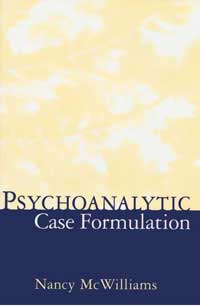 240 pages
240 pages8 CE credits
Course Enrollment
$200.00
Add to Cart
All exams are taken online. The exam for this course will be available in "My Courses" immediately upon enrollment. Note the book is not included.
The book is available for purchase from Amazon.
As an Amazon Associate we receive a rebate from qualifying purchases.
PSYCHOANALYTIC CASE FORMULATION
Nancy McWilliams, Ph.DThe Guilford Press, 1999
DESCRIPTION
What kinds of questions do experienced therapists ask themselves when facing a new client? How can clinical expertise be taught? From the author of the landmark Psychoanalytic Diagnosis, this book takes clinicians step-by- step through developing an understanding of each client's unique psychology and using this information to guide and inform treatment decisions. McWilliams shows that while seasoned practitioners rely upon established diagnostic categories for record-keeping and insurance purposes, their actual clinical concepts and practices reflect more inferential, subjective, and intuitive processes. Interweaving illustrative case examples with theoretical insights and clinically significant research, chapters cover assessment of client temperament, developmental issues, defenses, affects, identifications, relational patterns, self-esteem needs, and pathogenic beliefs.
Winner--Gradiva Award, National Association for the Advancement of Psychoanalysis
The reader will be able to:
• Explain the relationship between case formulation and psychotherapy
• Assess what elements in case formulation cannot be changed
• Describe various developmental issues that may present themselves in the case formulation process
• Recognize the psychological defenses a patient has put in thoughts and behavior
• List types of affects and their positive and negative extensions
• Define the relational patterns
• Incorporate the substance of self-esteem in case formulation
• Describe pathogenic beliefs and how these influence case formulation
AUTHOR
Nancy McWilliams, Ph.D, ABPP, teaches psychoanalytic theory and therapy at the Graduate School of Applied and Professional Psychology at Rutgers. She is a senior analyst with the Institute for Psychoanalysis and Psychotherapy of New Jersey and the National Psychological Association for Psychoanalysis.
EDITORIAL REVIEWS"Books by Nancy McWilliams used in unison make the best psychodynamic resources I have yet encountered in more than 60 years in the field."
--Robert C. Lane, PhD, Department of Psychology, Nova Southeastern University
"This beautifully written, uniquely accessible guide to the psychoanalytic understanding of clinical cases will be of immense value to students and practitioners of all theoretical persuasions. I predict it will be among the most important and widely used books in this field for years to come."
--George E. Atwood, PhD, Professor of Psychology, Rutgers University, New Brunswick, New Jersey
"Psychoanalytic Case Formulation is a worthy successor to Psychoanalytic Diagnosis. Nancy McWilliams has a pellucid writing style that brings complex concepts within the easy grasp of the reader. She has produced a book that is intelligently psychoanalytic without being restricted to any single vision of psychoanalysis. The critical concepts are developed well and the issues important to assessment--a concept that goes well beyond diagnosis--are explicated clearly and helpfully. This is a rare book that can serve as a text for beginning students and still has much to offer to accomplished professionals."
--George Stricker, PhD, The Derner Institute, Adelphi University, Garden City, NY
ISHK CE at Home
1702-L Meridian Ave., #266
San Jose, CA 95125-5586
This website uses cookies to ensure you get the best experience on our website. Learn more
